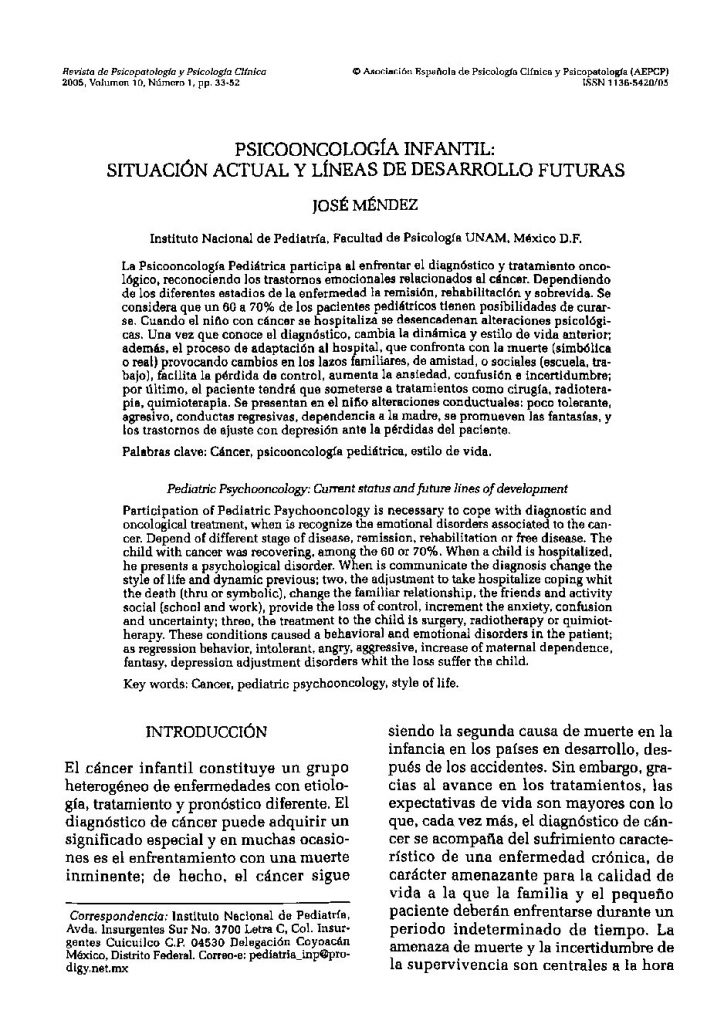Psicooncología infantil: Situación actual y líneas de desarrollo futuras.
Psicooncología infantil: Situación actual y líneas de desarrollo futuras.

- Acerca de “afrontamiento” y “enfermedad crónica”: una reflexión ¿fundada? con alguna sugerencia.
- Tratamiento psicológico en el trastorno de somatización: eficacia y propuestas de intervención.
- Barreras para el manejo efectivo del dolor crónico.
- Psicooncología infantil: Situación actual y líneas de desarrollo futuras.
- Aportaciones desde la psicología al tratamiento de las personas con infección por VIH/SIDA.
- Psicología y VIH/SIDA en México: su prevención con base en un modelo psicológico de salud biológica.
- El síndrome de fatiga crónica: características psicológicas y terapia cognitivoconductual.
- La úlcera péptica: ¿un trastorno gastrointestinal infeccioso o biopsicosocial?.
Participation of Pediatric Psychooncology is necessary to cope with diagnostic and oncological treatment, when is recognize the emotional disorders associated to the cancer. Depend of different stage of disease, remission, rehabilitation or free disease. The child with cancer was recovering, among the 60 or 70%. When a child is hospitalized, he presents a psychological disorder. When is communicate the diagnosis change the style of life and dynamic previous; two, the adjustment to take hospitalize coping whit the death (thru or symbolic), change the familiar relationship, the friends and activity social (school and work), provide the loss of control, increment the anxiety, confusion and uncertainty; three, the treatment to the child is surgery, radiotherapy or quimiotherapy. These conditions caused a behavioral and emotional disorders in the patient; as regression behavior, intolerant, angry, aggressive, increase of maternal dependence, fantasy, depression adjustment disorders whit the loss suffer the child.
La Psicooncología Pediátrica participa al enfrentar el diagnóstico y tratamiento oncológico, reconociendo los trastornos emocionales relacionados al cáncer. Dependiendo de los diferentes estadios de la enfermedad la remisión, rehabilitación y sobrevida. Se considera que un 60 a 70% de los pacientes pediátricos tienen posibilidades de curarse. Cuando el niño con cáncer se hospitaliza se desencadenan alteraciones psicológicas. Una vez que conoce el diagnóstico, cambia la dinámica y estilo de vida anterior; además, el proceso de adaptación al hospital, que confronta con la muerte (simbólica o real) provocando cambios en los lazos familiares, de amistad, o sociales (escuela, trabajo), facilita la pérdida de control, aumenta la ansiedad, confusión e incertidumbre; por último, el paciente tendrá que someterse a tratamientos como cirugía, radioterapia, quimioterapia. Se presentan en el niño alteraciones conductuales: poco tolerante, agresivo, conductas regresivas, dependencia a la madre, se promueven las fantasías, y los trastornos de ajuste con depresión ante la pérdidas del paciente.



